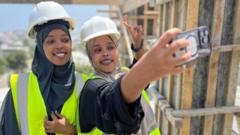The rebuilding of Somalia's capital, Mogadishu, is witnessing a significant transformation, led by innovative female engineers like Fathi Mohamed Abdi and Saadia Ahmed Omar. Both women, only 24, are spearheading the construction of a new 10-floor apartment complex in the Hodan District, symbolizing a fresh start for a city long marred by conflict.
Navigating through construction sites and overseeing crews of men, the duo challenges stereotypes and societal expectations. “When I started, people doubted me; they questioned whether they could trust a woman with their homes,” Fathi shared, highlighting the skepticism she faced. After five years of experience in a field dominated by men, both women are determined to reshape Mogadishu. “Mogadishu needs us,” stated Saadia, who envisions a future where their contributions play a pivotal role in the city's recovery.
Over the past five years, over 6,000 new buildings have rapidly emerged in Mogadishu. The assistant chairman of the Somali Engineers Association, Ibrahim Abdi Heyle, emphasized the high demand for professionals, especially women, as a driving force in this transition. Their involvement not only addresses the workforce shortage but also introduces diverse perspectives critical for innovative solutions in the construction sector.
Despite these advances, progress is tempered by challenges. Women make up a mere 5% of engineers in Somalia and often face barriers to professional growth, with limited opportunities for mentorship. Saadia noted the difficulty she encountered when seeking internships, facing multiple rejections due to gender biases against physical demands in engineering.
In the midst of this growth, critics voice concerns over the rapid transformation of Mogadishu’s character. Veteran architect Siidow Cabdulle Boolaay lamented the loss of Italy's architectural heritage and warned of safety hazards posed by the use of subpar materials in construction. Despite historical shortcomings, the mayor's office now asserts that quality control measures are actively being enforced.
While ongoing urbanization opens the door to innovative infrastructure, the city grapples with environmental challenges. Experts like Christophe Hodder from the UN advocate for sustainable water and sewage management to prevent future crises amid escalating construction demands.
Adapting to these concerns, the Somali government, alongside international partners, is working to develop improved urban planning regulations. However, such efforts may require the tough decision of demolishing existing structures, worrying residents reliant on these buildings.
Even as dangerous militant threats loom over Mogadishu, the spirit of resilience remains unyielding among the city's engineers. “Our dreams have not been halted by violence. We are renewing a profession that had faded,” remarked Mr. Heyle, showcasing a collective determination to pave the way for a modern Mogadishu.
Though obstacles remain, the future for Mogadishu looks bright as women like Fathi and Saadia champion change, proving their capabilities in the construction realm. Both engineers share a vision that blends practicality with hope: “We are not merely constructing buildings; we are constructing hope," noted Ms. Abdi, reflecting the profound impact of their work not just on the landscape, but on their communities and society at large.

















